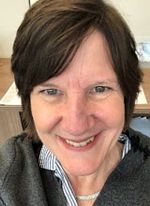|
  Jill Maher, MA, COE (left) and Joan Jaeger, MA, MBA (right) share information about Hadley, an invaluable free resource for patients struggling with visual impairment who have no support during the coronavirus pandemic. Jill Maher, MA, COE (left) and Joan Jaeger, MA, MBA (right) share information about Hadley, an invaluable free resource for patients struggling with visual impairment who have no support during the coronavirus pandemic.
|
If COVID-19 has made it difficult for sighted people, patients with a visual impairment are struggling even more during the pandemic.
Isolated and being forced to be independent without face-to-face support from friends and family, people with visual impairment can’t get help from state agencies and private vision rehabilitation firms because resources are dramatically reduced due to the pandemic.
Most rehab therapists have paused trips into patients’ homes to teach them low vision and nonvisual techniques for daily living. Yet the need for services persists.
Patients with visual impairment often cite three things they wish they had as soon as it became clear that they would be facing a visual impairment that might be permanent: practical help, connection to experts and social interaction. Although resources may be out there, there is no guide to finding them. Patients typically struggle for months, if not years before finding the help they need.
Ophthalmic practices should definitely add Hadley to their patient information resources. Hadley is a 100-year old private agency offering practical help, connection and support free to anyone with a visual impairment and the families and professionals who support them. The nonprofit serves all 50 states and help is offered online at www.hadley.edu, on the phone, or in the mail.
What is empowering for your patients is that Hadley’s help is practical and includes assistance with everyday matters such as cooking, signing your name, or using a smart phone. Over 500 workshops are staffed by experts in the field.
As AAOE® members well know, being part of a community of peers is invaluable. Hadley offers this community connectedness via phone-in discussion groups who can share ideas and concerns with others who are also visually impaired and others who “get it.” More personalized questions are readily answered, and connection is just a phone call away.
With the recent surge of the coronavirus, more rigorous social distancing is likely to continue for several months. Connecting your low vision patients with Hadley may be just the help they need to give them hope for the future and is another powerful tool to expand and enhance your patient experience efforts.
Learn more about Hadley.
About the authors:
Jill Maher, MA, COE, is the principal consultant and owner of Maher Medical Practice Consulting located in Chicago. She consults with ophthalmic and other medical practices as well as teaching institutions. Maher has more than 25 years of experience in the health care industry working with Fortune 100 companies. She has extensive experience in sales management and national accounts, including more than 22 years with Wyeth, Johnson & Johnson and Allergan. Her background includes expertise in strategic planning, financial analysis, marketing and creating high-performance teams.
Joan Jaeger, MA, MBA, is currently the chief marketing officer at Hadley, a learning destination for adults facing vision loss. Prior to Hadley, she was vice president of marketing and communications at The Cradle, one of the country’s leading child welfare organizations. Jaeger also was the marketing director at Johnson & Johnson’s international division, introducing a wide variety of household brands into the markets in Eastern Europe. In addition to an MBA, she has an MA in Russian and East European Studies from University of Michigan.